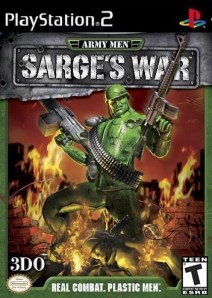[Editor’s note: For the next week or so, we’ll be running a series of posts from Jason Bergman, senior producer at Bethesda Softworks. Jason’s a nice guy and an unique game industry figure because he’s worked as a journalist, a publicist and has been on the developer side for a few years now. He’ll be gracing Techland with his wit and wisdom about everything from breaking into games to behind-the-scenes glimpses of the making of Fallout: New Vegas. We’re super-glad to have him on board and think you’ll enjoy his insights.]
Video games! Who doesn’t want to work in video games? It’s cool! You get to work on awesome stuff with awesome people. You get to sit around and play games all day and get paid for it. What’s not to love?
(More on Techland: Fallout: New Vegas Drops the Bomb on Sin City)
And hey, you know what? That’s all true. But there are a few things you should know about working in games if it’s your lifelong dream.
 #1: Making games is hard work.
#1: Making games is hard work.
No, really. Making games is very, very hard work. During crunch time, the hours are exceedingly long, the workload is immense, and weekend work isn’t just requested, it’s expected. Most games have a month or two or three of crunch, but some games can have twice that. Yes, there are studios that swear they don’t do crunch time, but they’re rare. Most developers will tell you crunch stories that will turn your hair white. It’s best to suck it up and assume crunch is part of the job. If you can’t handle it, the video game industry might not be for you.
(More on Techland: The Playstation and Me: Scott Rohde, Part 1)
#2: They get the least respect, but QA is the backbone of the industry.
Nobody ever plays a game that’s super-polished and thinks, “Wow, <DEVELOPERNAME> has awesome QA testers!” But, the fact is that behind every game is a QA team. And these guys work like madmen, doing the grunt work that absolutely powers the industry and all the games we release.
 So what do they do? You know that game you played for six hours? They played it for six months. Or a year. Or more. And they didn’t just play it, they absolutely devoured it. They played every level. Over and over again. They walked up to every texture and examined it. They played it in every language. They started a game and ripped the network cable out of the back to see what would happen. They checked every object from every angle. They put in a memory card (remember those?) to make sure it worked with corrupted data. They plugged four controllers in and tried playing a single player game with the third one. And that’s just for starters. You should see some of the insane test cases we had on Fallout: New Vegas, where every character (but one!) can be killed.
So what do they do? You know that game you played for six hours? They played it for six months. Or a year. Or more. And they didn’t just play it, they absolutely devoured it. They played every level. Over and over again. They walked up to every texture and examined it. They played it in every language. They started a game and ripped the network cable out of the back to see what would happen. They checked every object from every angle. They put in a memory card (remember those?) to make sure it worked with corrupted data. They plugged four controllers in and tried playing a single player game with the third one. And that’s just for starters. You should see some of the insane test cases we had on Fallout: New Vegas, where every character (but one!) can be killed.
(More on Techland: America’s Top Game Tester: Sony Announces the Cast of Its New Reality Show)
QA is hard, hard work. People assume that QA testers play games all day long, and that’s not entirely untrue, but there’s a lot more to it than that. The hours are long (even by game industry standards) and the pay is entry-level, but boy does it make a difference.
#3: There are lots of ways to break into the industry.
If you want to work in games (I mean really, really work in games) then you probably can. You just need to make a plan and stick to it. The easiest way to break in is QA. As I mentioned above, the pay’s not great, the hours suck and it’s really, really hard work, but chances are there’s a game studio looking for QA testers right now. If you want to break in, find a developer or publisher near you and apply. All you need is a high school diploma (or GED) and the ability to form a coherent sentence. If you don’t live near a game publisher, you may have to move, since it’s highly unlikely that anyone is going to pay for relocation for an entry-level job. Hell, even that guy who won Sony’s reality show The Tester spent his prize money to move to the west coast to actually take the job. Ouch.
The very low bar for entry means that QA attracts two kinds of people: the very, very driven, and the absolute opposite. If you’re super-motivated, you will move up over time, but you’re going to have to put in a lot of hours and really distinguish yourself to do it. If not, you’ll either burn out or be one of those people who live with their parents until they’re 40. But, if you’re up for it, you’ll get access to all levels of game development and really see first-hand how the whole process comes together. If you’ve got the drive, QA is the easiest way to break into the industry, regardless of where you want to end up.
(More on Techland: Exclusive: WCG Ultimate Gamer 2’s Gamers on What Drove Them Mad Last Night)
 Now, if you’re an artist, the best thing you can do is get a degree from an art school. If you want to be a concept artist, study 2D art and really, really get some skills. Build a portfolio and get your work out there on DeviantART or game community sites. Guys like the great Dhabih Eng of Valve (that’s his work on the right) came out of the community and now thrive, so it can totally be done. If you want to be a 3D artist or animator, do the same thing, but also see if you can contribute to a mod team. That’s a great thing for just about anyone looking to make games, as you’ll learn the same development processes that are used by professionals.
Now, if you’re an artist, the best thing you can do is get a degree from an art school. If you want to be a concept artist, study 2D art and really, really get some skills. Build a portfolio and get your work out there on DeviantART or game community sites. Guys like the great Dhabih Eng of Valve (that’s his work on the right) came out of the community and now thrive, so it can totally be done. If you want to be a 3D artist or animator, do the same thing, but also see if you can contribute to a mod team. That’s a great thing for just about anyone looking to make games, as you’ll learn the same development processes that are used by professionals.
For designers and programmers, again, look to join a mod team. If you’ve been around the gaming scene for a decade or more, look at the credits for Call of Duty: Modern Warfare. Recognize any of those names? An awful lot of them were mod authors back in the Quake days. Left4Dead? Mod guys. Lead designer on Civilization V? Mod guy. One of the designers on Fallout: New Vegas was the creator of Oscuro’s Oblivion mod. He’d never worked on a retail product before, but he slipped right in and made a real difference because he already knew the engine so well.
But, really, there are lots of ways to break in. Head to Kongregate Labs and learn to make simple Flash games. Cost of Macromedia Flash too high for you? Check out the Torque or Unity engines. Or, get yourself an Android or iPhone dev account and try making some simple mobile games. Minecraft, the latest indie success story, was written in Java. You can teach yourself that without ever spending a penny, just by searching Google and reading forum posts.
Bottom line: if you want to make games, you can totally make games.
#4: Not every game is gonna be the next Halo.
 I may have just finished up work on Fallout: New Vegas (woo!) and I’ve worked with some absolutely brilliant developers in the past, like Firaxis and Irrational, but let’s be honest – not every game is one of those. My first job on this side of the industry fence was in PR and the first thing I took out on tour was an Army Men game. Now you want to see hatred in a journalist’s eyes, just ask them to tell you about the last Army Men game they had to review. But wait, it gets better: the game I took out was picked up by my former employer after the demise of 3DO. Except, before 3DO went under, they sent out review copies, which resulted in a couple of reviews being run. So there I was, standing in front of these guys, some of whom had already reviewed the game, trying to convince them that this game was really awesome and they totally should write a preview. Yeah. It went over about as well as you’d think.
I may have just finished up work on Fallout: New Vegas (woo!) and I’ve worked with some absolutely brilliant developers in the past, like Firaxis and Irrational, but let’s be honest – not every game is one of those. My first job on this side of the industry fence was in PR and the first thing I took out on tour was an Army Men game. Now you want to see hatred in a journalist’s eyes, just ask them to tell you about the last Army Men game they had to review. But wait, it gets better: the game I took out was picked up by my former employer after the demise of 3DO. Except, before 3DO went under, they sent out review copies, which resulted in a couple of reviews being run. So there I was, standing in front of these guys, some of whom had already reviewed the game, trying to convince them that this game was really awesome and they totally should write a preview. Yeah. It went over about as well as you’d think.
Just suck it up and do your best to make the most out of what you’ve got. That Army Men game may not have been great, but it wasn’t terrible, and damn it I was going to do my best to make sure they heard about it. A year later, I was doing the same thing with Sid Meier’s Civilization IV. That was a little easier.
#5: It’s totally worth it
No question, there’s no place I’d rather be than working in games. For one thing, I have no useful skills outside of this industry. (When the apocalypse comes, I’m screwed). But really, no matter how painful the process can be, there’s still nothing like shipping something you’re proud of. If you want to work in games, make it happen.

